When Pakistanis make up their mind to work for the betterment of society then there is no limit to what we can achieve. This is not just a patriotic statement that I came up with. Examples of such benevolence and welfare projects are all around us. As part of our ‘Inspiration Pakistan’ series today we will introduce a project where a group of dedicated people have built a whole new Welfare City in rural Sindh. With facilities spread over approximately 100 acres, this complex is called Rashidabad.
Rashidabad is located near Tando Allahyar in Sindh. Tando Allahyar itself is located between Hyderabad (37 km) and Mirpur Khas (32 km).
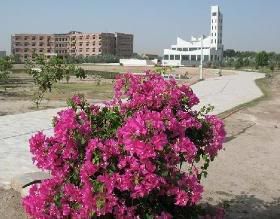 Rashidabad is a multi dimensional welfare project. It includes several schools, hospitals, housing and recreational facilities for the orphans and under-privileged of our society. It works on the true principles of Pakistaniat and serves the humanity irrespective of race, religion and ethnic background.
Rashidabad is a multi dimensional welfare project. It includes several schools, hospitals, housing and recreational facilities for the orphans and under-privileged of our society. It works on the true principles of Pakistaniat and serves the humanity irrespective of race, religion and ethnic background.
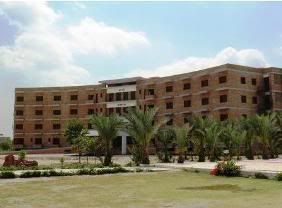 The quality services provided at Rashidabad are usually free of cost for the needy. The monthly expenses of the project are funded from the charity money and donations made by individuals, families and charitable institutions in Pakistan.
The quality services provided at Rashidabad are usually free of cost for the needy. The monthly expenses of the project are funded from the charity money and donations made by individuals, families and charitable institutions in Pakistan.
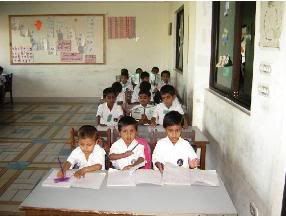 The project is a brain child of 1965 and 1971 war veteran, Air Commodore (Retd) Shabbir A. Khan. It is named after Flight Lieutenant Rashid A Khan, a student of PAF College Sargodha, who laid down his life for the nation. Work on the project started in December 13, 1998. At present the project is being run by Rashid Memorial Welfare Organization (RMWO).
The project is a brain child of 1965 and 1971 war veteran, Air Commodore (Retd) Shabbir A. Khan. It is named after Flight Lieutenant Rashid A Khan, a student of PAF College Sargodha, who laid down his life for the nation. Work on the project started in December 13, 1998. At present the project is being run by Rashid Memorial Welfare Organization (RMWO).
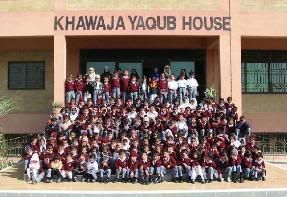 RMWO is also running several other welfare projects in collaboration with Government and Non-Governmental Organizations (NGO)s. To give some examples of this partnership, the Citizens Foundation (TCF), an NGO has a school inside Rashidabad. Another NGO called Mustafa Benevolent Trust (MBT) has been involved in the construction and maintenance of the orphanage as well as the main water purification plant in Rashidabad.
RMWO is also running several other welfare projects in collaboration with Government and Non-Governmental Organizations (NGO)s. To give some examples of this partnership, the Citizens Foundation (TCF), an NGO has a school inside Rashidabad. Another NGO called Mustafa Benevolent Trust (MBT) has been involved in the construction and maintenance of the orphanage as well as the main water purification plant in Rashidabad.
Schools in Rashidabad:
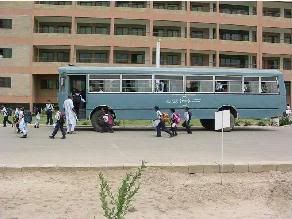 Rashidabad complex already has three schools built and functioning. These include the Yaqub Khawaja (YK) Academy, The Citizens Foundation (TCF) School and the Sargodhian Spirit Trust (SST) Public School. Collectively, these schools now have an enrollment of 1200 students.
Rashidabad complex already has three schools built and functioning. These include the Yaqub Khawaja (YK) Academy, The Citizens Foundation (TCF) School and the Sargodhian Spirit Trust (SST) Public School. Collectively, these schools now have an enrollment of 1200 students.
The SST Public School has a strength of around 400 students with twenty percent of them studying free. Similarly the YK Academy has twenty five percent students who study free. The TCF High School has a monthly fee of only Rs. 100 and provides books and uniforms also within it. Poor students pay only Rs. 25 with the same privileges. Such students constitute over 35 percent of this school’s enrollment.
The Orphanage at Rashidabad:
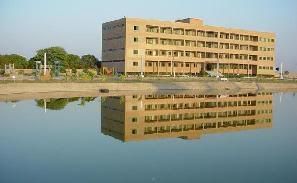 The orphanage is named Amzi home after the Donors Abdullah Mustafa and Zainab Ishaq from Bahrain. It is a five-storey building that can accommodate nearly 288 people, including 32 senior citizens. The building has been completed at a cost of more than $1 million.
The orphanage is named Amzi home after the Donors Abdullah Mustafa and Zainab Ishaq from Bahrain. It is a five-storey building that can accommodate nearly 288 people, including 32 senior citizens. The building has been completed at a cost of more than $1 million.
Elevators run on all floors. This eases the mobility for the senior citizens. Each room at the Amzi home can accommodate up to 12 children.
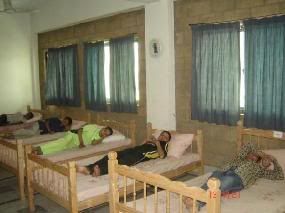 The orphans (presently 86) who are at Rashidabad come from all over the country and belong to different cultures and backgrounds. Mr. Iqbal Samad Khan, the Chief Volunteer of Rashidabad project proudly calls it ‘Our Mini Pakistan.’
The orphans (presently 86) who are at Rashidabad come from all over the country and belong to different cultures and backgrounds. Mr. Iqbal Samad Khan, the Chief Volunteer of Rashidabad project proudly calls it ‘Our Mini Pakistan.’
Foster mothers are also on staff at the orphanage to provide best attention to kids as young as few years old. At present the youngest pupil is from a village in Dadu and is only 3 and a half year old. Rashidabad Complex also provided host facilities to the orphans of Kashmir Earthquake of 2005.
Main Hospital at Rashidabad
 The main hospital of Rahidabad is run by Shehnaz A. Ghani Trust for the day to day operation and maintenance. The hospital plans to include state-of-the-art medical facilities. Two complete floors of the Hospital are planned to be handed over to the SIUT of Karachi to work as its satellite for Rural Sindh.
The main hospital of Rahidabad is run by Shehnaz A. Ghani Trust for the day to day operation and maintenance. The hospital plans to include state-of-the-art medical facilities. Two complete floors of the Hospital are planned to be handed over to the SIUT of Karachi to work as its satellite for Rural Sindh.
Eye Hospital at Rashidabad
With active assistance and participation from Layton Rahimtoola Benevolent Trust (LRBT) an eye hospital has also been set up at Rashidabad. It was inaugurated on June 28, 2008. The eye hospital has a capacity of giving medical treatment to about 300 patients a day. An average of 50 operations are conducted from Monday through Friday. All this is being done mostly free of cost to the needy patients.
Other School Projects Around Rashidabad area:
In addition to three schools witihn Rashidabad, RMWO also runs twenty Non Formal Schools within a 20 kilometer radius around Rashidabad.
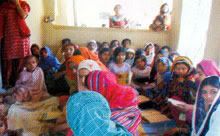 These schools function for two hours a day in remote areas with an average of 25 students. They are taught the Jugnoo Course here which enables the students (grand mothers, mothers, girls and boys) to learn basic Urdu and Maths – much more than the definition of literacy in Pakistan.
These schools function for two hours a day in remote areas with an average of 25 students. They are taught the Jugnoo Course here which enables the students (grand mothers, mothers, girls and boys) to learn basic Urdu and Maths – much more than the definition of literacy in Pakistan.
Railway Station at Rashidabad
Rashidabad Welfare City has its own Railway Station. Seen in the photo below is a train from Karachi approaching Rashidabad Station
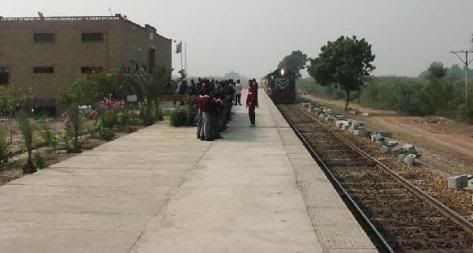
Why this Post?
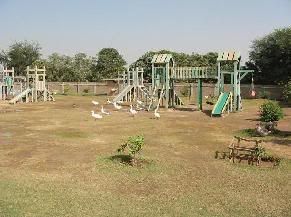 I have personally not visited Rashidabad project yet but I’ve been closely following its development for the past few years. I also know first hand the commitment of its volunteers and how much dedicated they are to make this an exemplary welfare project. This is the reason that we have chosen to feature this Project on the pages of Pakistaniat. It makes us proud.
I have personally not visited Rashidabad project yet but I’ve been closely following its development for the past few years. I also know first hand the commitment of its volunteers and how much dedicated they are to make this an exemplary welfare project. This is the reason that we have chosen to feature this Project on the pages of Pakistaniat. It makes us proud.
References and Credits:
1. Mr Iqbal Samad Khan, ex GM Pakistan Railway and Chief Volunteer at Rashidabad.
2. Rashid Memorial Welfare Organization
3. Rashidabad at Pakistan Economist
3. Rashidabad – Begining Charity at Home by Mehroz Sadruddin
4. Rashid-abad by Unaiza Naseem
5. SST Public School at Rashidabad
6. The Citizens Foundation
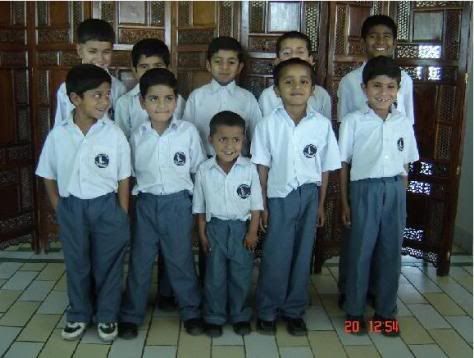



















































I think there is a lot of misinformation floating around about Pakistan’s economy and society, particularly about rich-poor gap, poverty, hunger and sanitation relative to other South Asian nations such as India and Bangladesh. Let me share some data to try and correct it:
1. Pakistan is the most egalitarian nation in its region as measured by Gini coefficient. According to the new UN-HABITAT report on the State of the World’s Cities 2008/9: Harmonious Cities, China has the highest level of consumption inequality based on Gini Coefficient in the Asia region, higher than Pakistan (0.298), Bangladesh (0.318), India (0.325), and Indonesia (0.343), among others.” Gini coefficient is defined as a ratio with values between 0 and 1: A low Gini coefficient indicates more equal income or wealth distribution, while a high Gini coefficient indicates more unequal distribution. 0 corresponds to perfect equality (everyone having exactly the same income) and 1 corresponds to perfect inequality (where one person has all the income, while everyone else has zero income).
2. The World Hunger Index of 88 countries published by IFPRI last year ranked India at 66 while Pakistan was slightly better at 61 and Bangladesh slightly worse at 70.
3. An important way to measure progress in Pakistan for the poor is is terms of the probability of Pakistan achieving the UN Millennium Dev Goals (MDGs). Pakistan ranks at 45, well ahead of India at 62 and it is included in the medium performing countries. PHI is a new composite indicator
You’re right, Zia….that’s why the cricket victory, while it was “just sports”, was such heady perfume. Sometimes people need a morale booster. It’s wrong to underestimate the importance of pride and good morale.
The danger lies in reliance on the good gesture, or passive acceptance. That isn’t a danger among the poor, but complacency among those who are a bit more comfortable is a danger.
As to what to do and how to implement it, the neighbors in Iran are showing the way. Pakistan may not be quite ready, but there will be a “trigger event” and then the people will be out in the streets.
If everyone is prepared, it can be like the Wall coming down–bloodless and clean. But I fear it won’t be. And I fear the mullahs will be the new leaders. That’s why the complacency is a threat.
Tina,
Most of Pakistanis will agree with you.There is no accountability of ruling class,gap between rich and poor keeps widening.Our problems are unique masses are being manipulated by elitist ruling class on one hand and the Mullas are also trying to exploit them.
We don’t have any Voltaire,Locke or Hobbes.We can’t even tolerate the likes of Dr Hoodbhoy.
If you have any solutions and know how to implement them please let us know.
In the meantime we should encourage every little bit of good in our society.Just my humble opinion.
Ah, Benawa–
You got it partly right….
In the face of illiteracy affecting tens of millions, a few private schools educating a handful of students on charity is yes, you’ve got it, pretty much pointless. Anything that fails to educate most of the millions is going to be.
And in the face of a government that doesn’t govern except to squirrel billions away in Dubai for a couple of families, even quite a lot of private philanthropy really is pointless. Nobody, with a few exceptions, gives away so much that their own comfort is endangered.
It’s not that things aren’t perfect–if they were only “not perfect” your point might make sense–it’s that they are horribly bad, and some posters apparently think garage schools et al are an acceptable replacement for a government! This attitude is both frightening and a bad sign for the future (BTW there are a ton of Americans who think the same thing, and they are equally as terrifying. A segment of them have been trying to dismantle the U.S. government for the last eight years).
I imagine this as being like a town full of people whose police force, in a team effort with all the thugs they should be arresting, is rampaging through everyone’s homes pillaging and murdering. A couple of old grannies decide to sit out on their porches with flyswatters, and the citizenry decides that the best they are ever going to have is grannies with flyswatters, so they settle for that as their standard of law enforcement.
Soon, the town is in a total state of anarchy and free-for-all looting, with the near-sighted grannies taking a swipe at something now and then–in vain of course, but the townspeople have come to accept that this is the new normal. They’ve in fact forgotten that there was a time when things worked differently!
Pretty soon the TV station and prominent bloggers in the community are busy honoring the “Dear Sweet Near Sighted Granny-with-a-Flyswatter of the Day” and the citizens watch each interview enthralled, ignoring the explosions, screams, ambulance sirens, and flames all around them.
Wouldn’t an observer passing through rightly suggest that the more pertinent task at hand is to sack the police and hire some people who would jail the criminals? Should the people attack this observer, yelling “Hey,everything’s fine, quit dissing our grannies! Turn that frown upside down, take a Prozac, and if you want to do something, grab a flyswatter…”?
Well?
It doesn’t matter to what extent Pakistanis themselves are upright, self-sacrificing model citizens when the country is in thrall to cutthroat mobsters and a rag-tag passle of self-appointed “aristocrats” (I’ll accept that Pakistan isn’t unique in having a ruling class of this profile, but Pakistan’s case at present is unusually severe).
I do believe this is a relevant observation, and getting rid of the above characters is the real call to action.
I confess I’m a little disturbed by all the people who think it’s unrealistic/rude/unacceptable/cheerless/etc. of me to say so.
Whose party am I breaking up, exactly? ;)
Ms.Tina is using the same trite and bogus argument that she usedwith an earlier post: since we don’t have a perfect public edu-cation system, it is pointless to have good private schools
and
since we don’t have a perfect political system, individual
activism is futile, etc.
Why do we have to choose between good governance and
private philanthropy? Why can’t we have both? The more
the merrier!
To be honest, Tina’s arguments have no relevance to the topic
at hand. The purpose of this post was to celebrate volunteerism
in Pakistan. (Amen to that–I hope volunteerism catches on
like wild fire–I hope it is infectious,”Ask not what your
country can do for you, ask what you can do for your country.”)
Ms. Tina merely wants to indulge herself with a petulent, and
pedantic argument. She wants to show off her knowledge
of the political philosophy. This is narcissism, pure and simple!
Did I miss something? Did Owais say that the good men
mentiond in this post blong to the exclusive club of the 86 feudal lords who supposedly control all the land in Pakistan?
Mr. Haq, I totally agree with you. All Pakistanis should learn
to be good, responsible citizens. Learning about their
civic duties must be an important part of our children’s education. We need can-do, go-get it, die-hard
optimists. Nay-sayers, and wet-blankets need not apply.